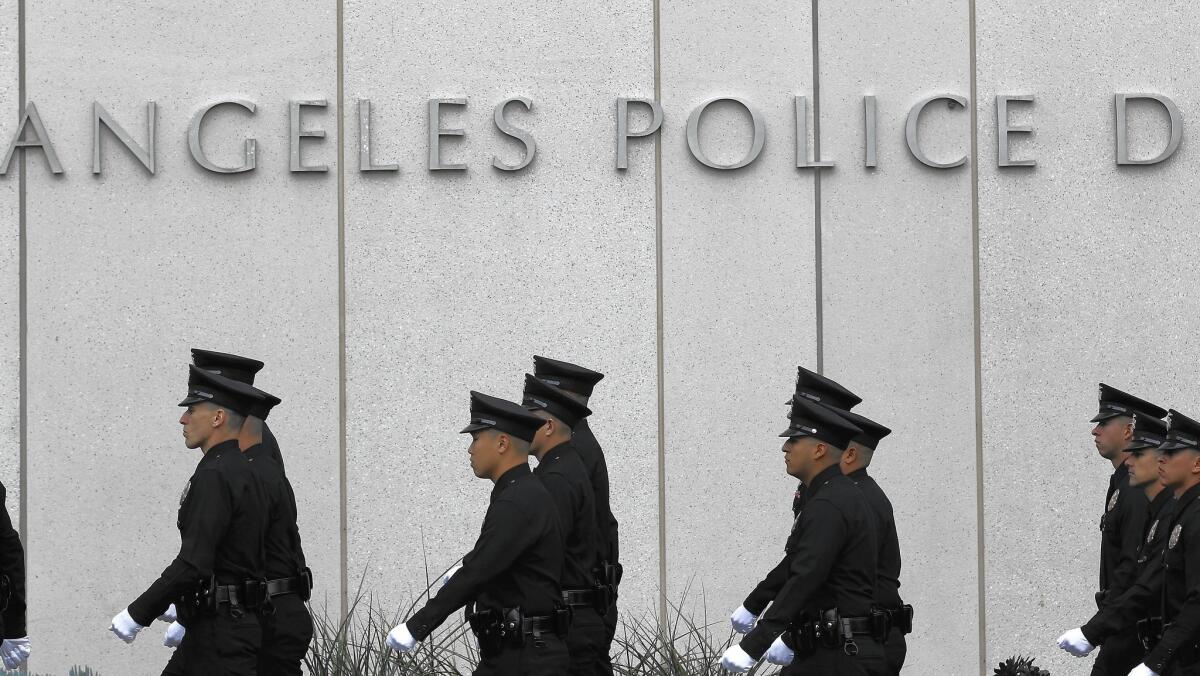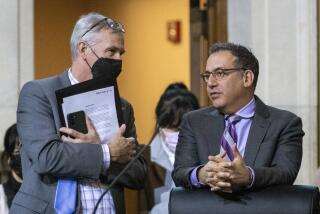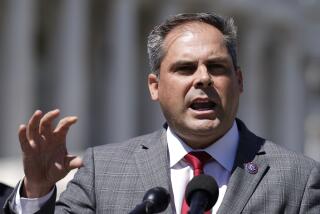Callers to City Hall demand big cuts from the LAPD

For years, Los Angeles city budget hearings have mostly drawn the usual collection of business, labor and nonprofit leaders who weigh in on such issues as sidewalk repairs, new bicycle lanes and the cost of feeding the animals in the city’s zoo.
But in the midst of a nationwide movement to end police brutality, Monday’s budget committee hearing drew an angry chorus of new voices demanding that council members defund the Los Angeles Police Department and invest more money in housing, social workers and jobs programs.
Some callers cast City Council members — many of them veterans of local and state politics — as out of touch with a public pushing for a complete reworking of city spending priorities and an end to police abuse.
“You are the past. Black Lives Matter and their allies are the future. Commit to our demands,” said Kendall Mayhew, a community organizer with Ground Game L.A., which is seeking to cut police spending by 90% and reinvest the funds into mental health counselors, tenant advocates and others assigned to respond to social ills.
Hundreds of people signed up to speak during Monday’s hearing. The vast majority of those who got through called for the LAPD budget to be dramatically scaled back or eliminated altogether.
One caller described the LAPD as a “scar” on the city, while another compared the department to a cancer that needed to be cut out.
“This is our time to lead,” said yet another caller. “It is happening with or without your agreement.”
For three decades, L.A. has expanded the LAPD. Now, it wants to cut back
Many at Monday’s hearing spoke in favor of the People’s Budget, an alternative spending plan for City Hall advanced by Black Lives Matter Los Angeles and several other organizations.
The plan would allocate 5.7% of the city’s general fund to the LAPD, a reduction of about 90% when compared with Mayor Eric Garcetti’s spending plan for the upcoming budget year.
The meeting was the first since Garcetti and Council President Nury Martinez promised to find up to $150 million in savings at the LAPD and redirect those savings to job programs, health initiatives and other services for black Angelenos and other communities of color.
The budget committee won’t take up the proposal from Garcetti and Martinez until June 15. Instead, council members heard two hours of public testimony and a grim report on the city’s reserve fund, which has been nearly depleted as city leaders work to balance the budget for the current fiscal year.
Council members typically review and approve the mayor’s budget each year. This time, however, they allowed Garcetti’s citywide spending plan to go into effect without a vote, saying there was too much uncertainty about the city’s revenue numbers that followed the shutdowns caused by the coronavirus outbreak.
Garcetti had originally proposed a 7% increase to the LAPD budget, only to change course in the wake of massive protests over police brutality sparked by the death of George Floyd in Minneapolis.
Councilman Mike Bonin, who represents coastal neighborhoods stretching from Westchester north to Pacific Palisades, said L.A. and the nation were at a moment of reckoning similar to the fall of the Soviet Union.
The city has spent generations expanding the size of the LAPD budget and “holding everything else hostage,” he said. Now, Angelenos are asking their leaders to take a different approach to how L.A. deals with homelessness, mental health crises and other pressing needs, he said.
“Things that seemed impossible two days ago now seem like they don’t go far enough,” he said.
But Councilman Paul Koretz, whose Westside district stretches from Westwood north to Encino, said he fears that city leaders are responding to an assortment of urgent issues — homelessness, the coronavirus outbreak and calls to address racial injustice — without keeping track of the money.
That type of spending, left unchecked, could push the city into bankruptcy, Koretz warned.
“We could look up suddenly and find we’re a billion dollars short in our budget and have no coherent way to address it,” he said.
The size of the police budget has been a source of criticism during previous budget cycles. But it hasn’t drawn such widespread scrutiny — and public outcry — until this year. The LAPD budget, when pensions and healthcare are included, is expected to consume $3.15 billion of the city’s $10.5 billion budget in the coming year.
Brady Collins with the Koreatown Immigrant Workers Alliance said the city “has still not done its part” since the 1992 civil unrest that followed the verdicts in the beating of Rodney King by police officers. Improving access to housing and economic opportunity is the best policy for preventing crime and recovering from the pandemic, he said.
“The city budget should invest in communities, not policing,” he said.
No one from the Los Angeles Police Protective League, the union that represents rank-and-file officers, testified during Monday’s hearing. But in a statement, league spokesman Dustin DeRollo called the notion of laying off 9,000 officers “absurd” and “reckless.”
“It would literally leave a city of millions protected by under 900 officers,” he said.
More to Read
Sign up for Essential California
The most important California stories and recommendations in your inbox every morning.
You may occasionally receive promotional content from the Los Angeles Times.












